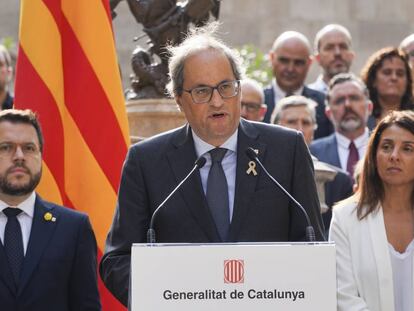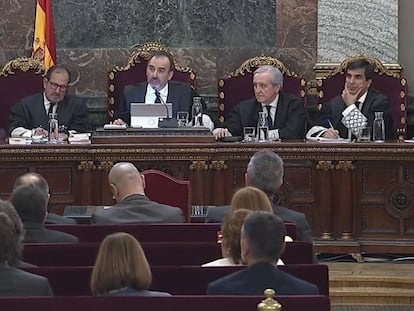Spain¡¯s Supreme Court rules out rebellion charge against Catalan separatist leaders
While the ruling is not expected until next week, legal sources said the 12 defendants will not be convicted of the top charge they were facing over the 2017 breakaway bid
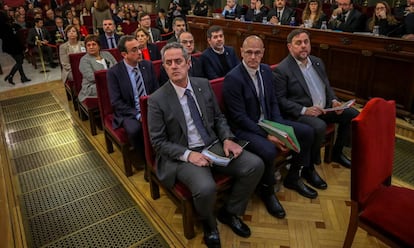
The Spanish Supreme Court has ruled out convicting 12 Catalan secessionist leaders of the crime of consummated rebellion in connection with the 2017 breakaway bid from Spain.
Although rebellion has been ruled out, the defendants could still be found guilty of sedition and misuse of public funds
This crime would have entailed prison terms of 15 to 25 years for the political and social leaders who organized an unauthorized referendum on October 1, 2017 and later made a unilateral independence declaration inside the Catalan parliament in defiance of the Constitutional Court, which had said these moves violated Spanish legislation.
All 12 individuals were tried at the Supreme Court in Madrid earlier this year at a high-profile trial involving four months of hearings and testimony from around 400 witnesses. The ruling will be made public early next week, and it is expected that the seven justices who heard the case have sought a unanimous decision.
The defendants
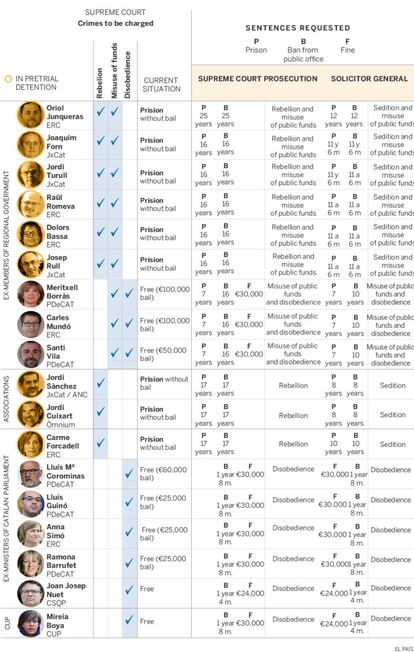
It is believed that at least nine convictions will be handed down because nine defendants remain in custody after being arrested in late October 2017, but penalties will vary depending on each defendant¡¯s participation in the secession attempt.
The crime of rebellion requires an element of violence, and in this particular case, it had to be proven that the defendants instigated violence as a tool to achieve independence from Spain. According to legal sources briefed on the matter, the court has found that the defendants did not commit these actions.
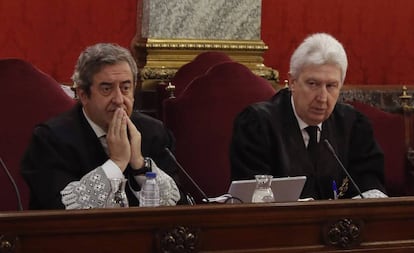
Sedition vs rebellion
The defendants could still be found guilty of sedition, among other possibilities. The difference between rebellion and sedition is that the former seeks to modify the Spanish state¡¯s structure by violating the law and instigating street violence, while the latter encourages riotous acts in order to prevent the application of the law.
The sedition charge was brought by Spain¡¯s Solicitor General, who represents the Spanish state in the courts and answers to the Justice Ministry. Unlike the public prosecution, this body did not pursue rebellion charges and instead focused on the lesser crimes of sedition and misuse of public funds, seeking a maximum prison term of 12 years for Catalan Republican Left (ERC) leader Oriol Junqueras, who served as deputy premier of Catalonia during the breakaway attempt.
Also awaiting sentencing are Jordi S¨¤nchez and Jordi Cuixart, the former heads of two civil society groups that campaigned actively for independence, and Carme Forcadell, the former speaker of the Catalan parliament.
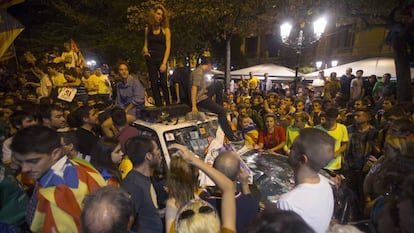
Street violence
The Supreme Court justices concluded that there were several days of street violence during the breakaway bid: on referendum day and before that, on September 20 and 21, when a crowd of around 40,000 independence supporters gathered in front of the building that houses the Catalan economy department, where a police raid was taking place in search of referendum-related documents.
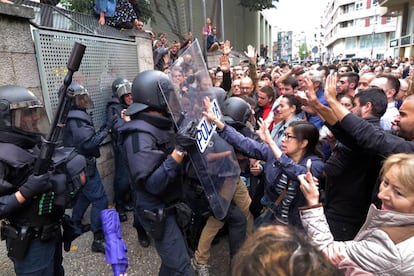
This mass gathering, which was organized by the civil society groups Assemblea Nacional Catalana (ANC) and ?mnium Cultural (then headed by S¨¤nchez and Cuixart, respectively), aimed to intimidate and hinder the work of the court-appointed envoys in charge of the search, according to prosecutors. Civil Guard vehicles sustained damage during the protests, but the Supreme Court has not found evidence that these were organized with the specific goal of achieving independence by force.
The same sources said that the justices also found violence in citizens¡¯ resistance against the riot police that was sent in to stop the unauthorized referendum from taking place on October 1, but that these acts did not constitute rebellion.
The former members of the Catalan government are also facing the possibility of being found guilty of misuse of public funds over the use of public money to organize the referendum. This crime is punishable with two to four years in prison, which can be raised to 12 if there are aggravating circumstances.
English version by Susana Urra.
Tu suscripci¨®n se est¨¢ usando en otro dispositivo
?Quieres a?adir otro usuario a tu suscripci¨®n?
Si contin¨²as leyendo en este dispositivo, no se podr¨¢ leer en el otro.
FlechaTu suscripci¨®n se est¨¢ usando en otro dispositivo y solo puedes acceder a EL PA?S desde un dispositivo a la vez.
Si quieres compartir tu cuenta, cambia tu suscripci¨®n a la modalidad Premium, as¨ª podr¨¢s a?adir otro usuario. Cada uno acceder¨¢ con su propia cuenta de email, lo que os permitir¨¢ personalizar vuestra experiencia en EL PA?S.
?Tienes una suscripci¨®n de empresa? Accede aqu¨ª para contratar m¨¢s cuentas.
En el caso de no saber qui¨¦n est¨¢ usando tu cuenta, te recomendamos cambiar tu contrase?a aqu¨ª.
Si decides continuar compartiendo tu cuenta, este mensaje se mostrar¨¢ en tu dispositivo y en el de la otra persona que est¨¢ usando tu cuenta de forma indefinida, afectando a tu experiencia de lectura. Puedes consultar aqu¨ª los t¨¦rminos y condiciones de la suscripci¨®n digital.
